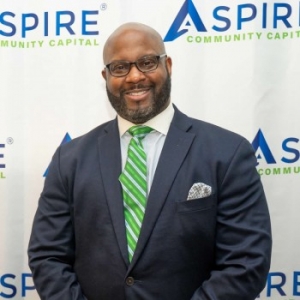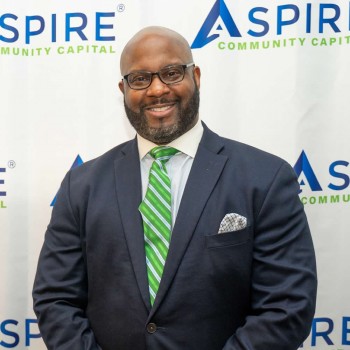
Historic West End – The Biscuit – Huetiful Celebration Brings West End Together To Celebrate The Black Community
July 15, 2020
ASPIRE Community Capital, One of Eight ECOSYSTEM Grant Recipients from NC IDEA and the North Carolina Black Entrepreneurship Council
December 17, 2020This article was taken from our friends over at The Biscuit. For more articles about creatives and nonprofits in Charlotte, visit here.
“…we want to teach financial responsibility – show our participants how the business world works.” – Manuel Campbell

Before Aspire Community Capital makes a loan, the nonprofit gives aspiring business owners the know-how and tools to realize their dream.
According to their Web site, Aspire “is committed to helping business owners in under-resourced communities to take full advantage of the promise of the American Dream.”
They do this by “teaching entrepreneurs how to build businesses within their own neighborhoods, using the skills they already have and the passion for success they already possess.”
Founder and CEO Manuel Campbell isn’t looking to train and fund just anyone with a good idea. He wants to provide, he said, “access, upward mobility and a means of creating wealth for people in low- to moderate-income neighborhoods – the communities that have been ignored for a long time.”
If they want funding, they have to put in the work first so they know how to best use the financial resources they seek. No, no one can apply for a loan until he or she has completed the first two steps of the program. Entrepreneurs in the making are put through the paces.
WORKING FOR FUNDING
 Campbell calls himself a “reformed banker.” He launched Aspire in 2016 but didn’t offer programming until 2019. He was busy building partnerships, assembling a board, securing funding.
Campbell calls himself a “reformed banker.” He launched Aspire in 2016 but didn’t offer programming until 2019. He was busy building partnerships, assembling a board, securing funding.
Three years later, the first cohort of the organization’s Community Business Academy (CBA) started the 12-week training course where every hopeful business owner starts his path at Aspire.
After completing the CBA, it’s on to the Business Accelerator. And once – and if – that hurdle is cleared, then it’s time to pursue funding.
Campbell, a former investment banker with experience at Wells Fargo and Bank of America, hopes to introduce the funding component by third or fourth quarter of this year. He’s in the process of getting certified as a Community Development Financial Institution (CDFI). CDFIs “inject new sources of capital into neighborhoods that lack access to funding,” according to the website.
To get CDFI-certified, Aspire must already be making loans. Most will be $3,000 and under. “We thought about offering grants,” Campbell said. “But we want to teach financial responsibility – show our participants how the business world works.” That starts with repaying a loan.
So, there are no handouts. There are no directives, either.
“We’re not telling people what to do,” Campbell said. “We’re offering guidance.”
THE COVID IMPACT
COVID-19 forced Campbell and his team to rethink that guidance. Rather than helping fledgling entrepreneurs take their business idea to the next level, they’ve been suggesting that the lockdown offers a good time to decide which of three paths makes the most sense.
- Pivot. (Can you alter your business model to offer your product in a virtual space?) One Aspire client who manufactured T-shirts switched up production to make just masks and opened an e-commerce channel.
- Pause. (Is now a good time to rethink your structure and offerings?)
- Stop. (Should you halt operations and examine alternatives?)
COVID has forced everyone – especially aspiring entrepreneurs – to get creative. “We have a client who’s looking at offering ‘day care’ at unusual times like nights and weekends when other daycares aren’t open,” Campbell said.
INVESTING, TRANSFORMING
 Aspire is funded through corporate and individual philanthropic donations, which means Campbell has turned into not just a CEO – but a fundraiser. He’s looking for like-minded people to join him on the journey of transforming lives.
Aspire is funded through corporate and individual philanthropic donations, which means Campbell has turned into not just a CEO – but a fundraiser. He’s looking for like-minded people to join him on the journey of transforming lives.
“I don’t want just investors,” he said with a laugh. “I want co-conspirators.”
It’s a rewarding investment. “I get to have a direct impact on people’s lives,” Campbell said. “I see the transformation take place.”
“When I left the for-profit space to become part of Charlotte’s nonprofit community, the learning curve was steep,” he said. He had some experience – through CULTIVATE, an incubator for emerging nonprofits, and Duke University’s nonprofit management program, which he attended through the United Way. He credits his board with helping him navigate.
CURRENT CONVERSATIONS
Recently, Campbell has been navigating urgent and necessary conversations – the kind many of us are having in the aftermath of George Floyd’s murder in Minneapolis.
“I’m happy about the level and depth of conversations now taking place,” Campbell said. “But I hope these conversations are going to turn into actions. As a community, we have to decide what that action is. What actions are we willing to take? Who’s willing to sacrifice? We can’t continue the status quo and just hope there’ll be change.”
 He’s optimistic that what’s happening now can lead to systemic change.
He’s optimistic that what’s happening now can lead to systemic change.
“What gives me hope is when I see the diversity among the protestors and the depth of the dialogue,” he said. “People have tried leading with money and letting their hearts follow. Now, we’ve got to lead with our hearts and let that direct where we invest our dollars. If you’re not leading with your heart, you’re not really committed to reform.”
Although this is a turbulent time, Campbell feels like now may be an inspired time to start a business. “It feels almost inevitable,” he said.
“It may even be a necessity for some. People who have been laid off or had their hours cut may need to start a business to generate or supplement their income.”

